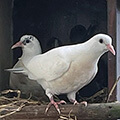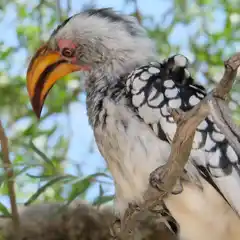Learning and application of an in vitro model for the evaluation of small molecules that inhibit the ferrochelatase of Eimeria tenella with potential anticoccidial effects
Dr Virginia Marugan-Hernandez, Royal Veterinary College, UK and Diego Guerra Arias, University of Granada, Spain
The coccidian Eimeria tenella is a parasite that replicates in the epithelial cells of the caeca in domestic chicken causing the disease chicken coccidiosis, characterised by a range of clinical symptoms including malabsorption, diarrhoea and haemorrhage. Heme is an essential molecule in most aerobic organisms, including coccidian, as it serves as a prosthetic group of hemoproteins involved in many fundamental physiological processes; the ferrochelatase enzyme is involved in the last step of the heme pathway. In a recent study, seven compounds predicted to inhibit ferrochelatase were able to inhibit E. tenella replication in vitro. These compounds were further tested in a dose-response assay with concentrations of 1, 5, 10 and 20 uM. A clear dose-dependent response was observed for most of the evaluated compounds, with three of them inhibiting the intracellular development of first-generation schizonts at the lowest doses.
Research Highlights
- Evaluation of predicted ferrochelatase inhibitors that previously showed effects on Eimeria tenella replication in vitro showed clear dose-dependent effects.
- Three predicted ferrochelatase inhibitors can inhibit first-generation schizont development at doses as low as 5 and/or 1 uM.
Benefits of the collaboration for the mobile researcher
- New knowledge about coccidian (Eimeria) parasite basic biology and impact in farm animals.
- Learning a wider range of experimental techniques.
- Generation of new data which will be included as a doctoral thesis chapter and a publication.
- Expansion of networking.
Benefits of the collaboration for the host research group
- International collaboration.
- Learning about specific coccidian biological pathways (heme metabolism).
- Application and further validation of the in vitro model developed by the group.
- Generation of new data to support further grant applications.
Return to the Researcher Mobility Grants Awarded page.
Return







